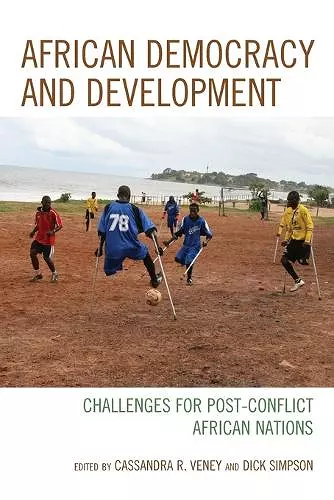African Democracy and Development
Challenges for Post-Conflict African Nations
Cassandra Rachel Veney editor Dick Simpson editor
Format:Paperback
Publisher:Lexington Books
Published:15th May '14
Currently unavailable, and unfortunately no date known when it will be back
This paperback is available in another edition too:
- Hardback£105.00(9780739175491)

Various African nations have undergone conflict situations since they gained their independence. This book focuses on particular countries that have faced conflict (civil wars and genocide) and are now in the process of rebuilding their political, economic, social, and educational institutions. The countries that are addressed in the book include: Rwanda, Mozambique, Sierra Leone, Liberia, and the Democratic Republic of the Congo. In addition, there is a chapter that addresses the role of the African Diaspora in conflict and post-conflict countries that include Eritrea, Liberia, and Somalia. The book includes an examination of the various actors who are involved in post-conflict rebuilding and reconstruction that involves internal and external participants. For example, it is clear that the internal actors involve Africans themselves as ordinary citizens, members of local and national governments, and members of non-governmental organizations. This allows the reader to understand the agency and empowerment of Africans in post-conflict reconstruction. Various institutions are addressed within the context of the roles they play in establishing governance organizations such as the Truth and Reconciliation Commission in Sierra Leone, the African Union, chiefs in Liberia, and non-governmental organizations. Furthermore, the external actors who are involved in post-conflict reconstruction are examined such as international non-governmental organizations and the African Diaspora. They both have their own constituents and agendas and can and do play a positive and negative role in post-conflict reconstruction. It is obvious that countries that are addressed in the book are in dire need of financial assistant to rebuild much needed infrastructure that was destroyed during the conflict. All of the countries covered in the book need schools, medical facilities, roads, bridges, airports, ports, and the government does not have the money to provide these. This is where the international non-governmental organizations and the African Diaspora play an important role. The chapters that address these issues are cognizant of their importance and at the same time, the authors realize that sovereignty can be undermined if Africans are not in the forefront of policy and decision making that will determine their future. There are chapters that provide a gendered analysis of post-conflict when it is appropriate. For example, it is clear that women, men, boys, and girls experienced conflict in different ways because of their gender. They...
African Democracy and Development edited by Simpson and Veney is an excellent discussion of post-conflict situations in Africa. Sierra Leone and Rwanda are the most deeply explored here and are two of the most spectacular cases of conflict in recent history. This work advances how we think about and study a welcome phenomenon in contemporary African states. -- K. C. Morrison, Mississippi State University
The literature on the challenges faced by post-conflict states is abundant. It is thus welcome that this edited book does not try to provide broad discussions but rather tackles precise and essential aspects of post-war situations. This constitutes the common thread of the book as it is quite successful in picking diverse but key issues related to post-conflict contexts. The book's second unifying principle is that it has a geographical bias towards Sierra Leone, Rwanda, and to a lesser extent Liberia and Mozambique. * Journal of Modern African Studies *
ISBN: 9780739197998
Dimensions: 228mm x 156mm x 24mm
Weight: 485g
314 pages